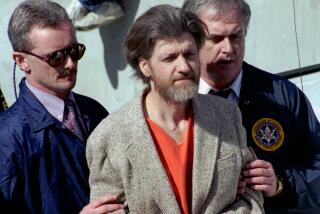Judge Rejects Kaczynski Bid for Freedom
- Share via
HELENA, Mont. — Unabomber suspect Theodore J. Kaczynski lost his first round in court Friday when a federal judge rejected his motion that he should be freed because of unfair publicity about his case.
“The defendant is not entitled to perfect treatment,” said U.S. District Judge Charles C. Lovell as he rejected the defense motion. “This is not a perfect world. He is entitled to fair treatment. I think he has received fair treatment and he will continue to receive fair treatment.”
Kaczynski, with his hair and beard newly trimmed short, sat next to his attorneys and watched quietly during the 25-minute hearing. Wearing khaki slacks and a light green shirt, the former math professor looked handsome in contrast to the hirsute, rumpled hermit taken into custody more than two weeks ago.
As he walked into the courtroom escorted by U.S. marshals, Kaczynski appeared self-confident but also slightly self-conscious before nearly 100 spectators and members of the news media.
Kaczynski is being held in jail in Helena on a charge of possessing unregistered explosives found in his cabin. But he has not been charged in any of the Unabomber’s 16 attacks, which killed three and injured 23.
Federal prosecutors are weighing what charges they should bring and where they should convene a federal grand jury to produce an indictment. Under federal rules, they have until at least May 3 to indict him on at least one count.
Kaczynski’s attorneys, Michael Donahoe and Anthony R. Gallagher, contend that proceedings against Kaczynski should be halted, his property returned and prosecutors barred from ever pursuing the case against him because leaks to the news media have prejudiced the public against him. The government leaks, they argue, were intentional and made it impossible for Kaczynski to receive a fair grand jury hearing or trial.
To prove their case, they asked Lovell to hold a hearing so they could question members of the media and a top Justice Department official about the government information leaks during a 10-day search of Kaczynski’s remote mountain shack. The judge also denied that request.
Among information made public during the search was the discovery in Kaczynski’s cabin of a completed package bomb, the original copy of the Unabomber’s manifesto and the manual typewriter apparently used to type the manuscript.
“These deliberate disclosures poisoned the entire population of grand jurors within the United States against Mr. Kaczynski,” the defense argued. “The government’s conduct in this case has been primitive and most nearly resembles the lynch mob mentality. . . .”
The defense motion was taken so seriously by the government that Robert J. Cleary, an assistant U.S. attorney from New Jersey who is now heading the Unabomber investigation, and Sherry Matteucci, the U.S. attorney for Montana, were both on hand to observe the proceedings.
Prosecutors acknowledged that some information about the case was improperly leaked to the media and called such leaks “deplorable.” But they contended that the revelations caused no lasting harm and would not prejudice grand jurors or trial jurors against Kaczynski.
Prosecutors also noted that much of the information leaked about the search properly became public a few days after appearing in publication when Lovell unsealed a list of more than 850 items found in Kaczynski’s shack.
“Although the leaks were inexcusable, much of the same information concerning the fruits of the search has come to light simply through the operation of law,” argued Assistant U.S. Atty. Bernard F. Hubley.
In documents filed with the court, prosecutors included a statement issued Wednesday by FBI Director Louis J. Freeh saying he had ordered an investigation early this month into leaks of information in the case.
“Unauthorized disclosure of investigative information or other confidential material will lead to immediate firing from the FBI and possible prosecution,” Freeh said. “Improper conduct will not be tolerated in this or any other case.”
Lovell said he considered the issue of media leaks to be important and told Kaczynski: “I do have sympathy with your position.”
Nevertheless, the judge said he believed that Freeh and Atty. Gen. Janet Reno had done all they could to prevent leaks and that any harm done by the improper release of information could be remedied at trial by ensuring that an unbiased jury is impaneled.
“The sanction of dismissal,” Lovell said, “is far too extreme.”
More to Read
Sign up for Essential California
The most important California stories and recommendations in your inbox every morning.
You may occasionally receive promotional content from the Los Angeles Times.












